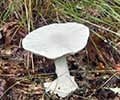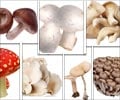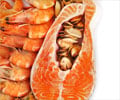- Mushroom allergy - (http://www.ncbi.nlm.nih.gov/pubmed/3278649)
- Mushroom poisoning: retrospective analysis of 294 cases - (https://www.ncbi.nlm.nih.gov/pmc/articles/PMC2882543/)
- Diseases and Competitor Moulds of Mushrooms and their Management - (https://dmrsolan.icar.gov.in/Disease___Competitor_Moulds__Dr._S.R._Sharma_.pdf)
- The Medicinal Mushroom, Grifola gargal, Ameliorates Allergic Bronchial Asthma - (https://pubmed.ncbi.nlm.nih.gov/29261008/)
- Mushroom Poisoning - (https://www.betterhealth.vic.gov.au/health/healthyliving/fungi-poisoning)
- Allergy and Immunology Glossary - (https://acaai.org/resources/information/allergy-glossary)
- Food Poisoning | Mushroom Poisoning - (https://familydoctor.org/condition/food-poisoning-mushroom-poisoning/ )
What is Mushroom Allergy?
Mushrooms are often considered as a delicacy and sought after for their nutritious and flavorful qualities, but a few people experience adverse reactions from eating them.(1✔ ✔Trusted Source
Mushroom allergy
Go to source) These adverse effects can be classified into three types: intolerance, allergy and poisoning.
Allergies cause an immediate response that can even be severe, while intolerance merely creates a discomfort or slight feeling of illness. Poisoning is caused by eating toxic mushrooms and displays classic symptoms depending on the type of toxic mushroom ingested.(2✔ ✔Trusted Source
Mushroom poisoning: retrospective analysis of 294 cases
Go to source)
The prevalence of mushroom allergy is not exactly known. It may be very slight (1%) from eating, but could, alternatively, be as prevalent as pollen and mould allergy when inhaled (10-30% of an allergic population)(1✔ ✔Trusted Source
Mushroom allergy
Go to source)
Paradoxically there are some medicinal mushrooms that have been found to be effective for the prevention and treatment of various chronic inflammatory diseases like asthma(3✔ ✔Trusted Source
The Medicinal Mushroom, Grifola gargal, Ameliorates Allergic Bronchial Asthma
Go to source).
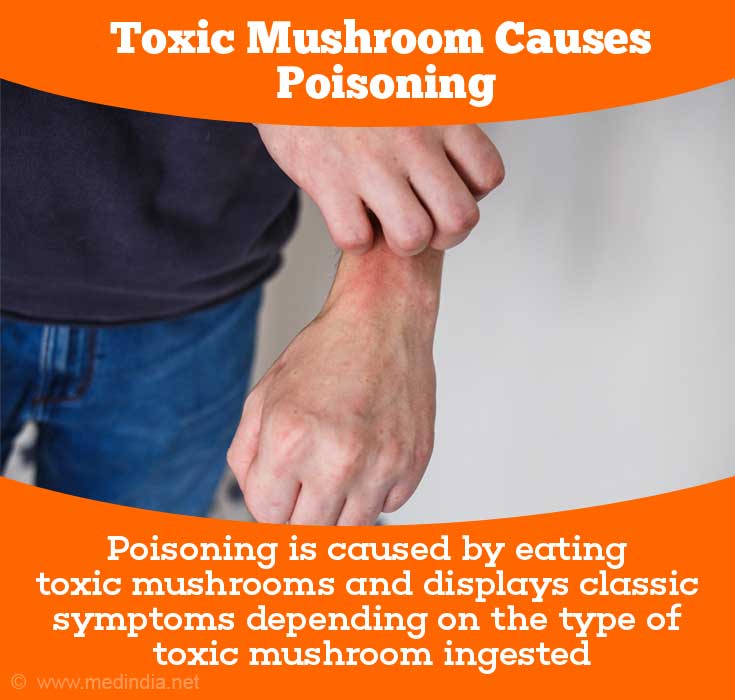
What Causes the Allergy?
The primary cause of mushroom allergy is that the body interprets the mushroom proteins to be foreign. The immune system releases IgE antibodies to combat these foreign proteins and this causes the release of a chemical called histamine.(4✔ ✔Trusted Source
Allergy and Immunology Glossary
Go to source) The release of histamine can cause a variety of symptoms related to allergy. The allergic reaction is caused either by eating mushrooms or inhalation of the spores.
What are the Symptoms?
Different species of mushrooms from Shiitake mushrooms to button mushrooms are capable of causing various signs and symptoms.(5✔ ✔Trusted Source
Diseases and Competitor Moulds of Mushrooms and their Management
Go to source)
- Consumption of mushrooms can trigger skin irritation, hives and rashes.
- Some people also reported swelling of lips, mouth and throat due to mushrooms. Swelling of the throat can cause difficulty in breathing. A severe allergic reaction or anaphylaxis can occur which sets a chain reaction of symptoms including a rapid drop in blood pressure, shortness of breath and fainting and, therefore, requires immediate clinical assistance.
- Inhalation of mushroom spores can inflame the upper respiratory tract and cause a runny nose and watery eyes. Wheezing may also occur.
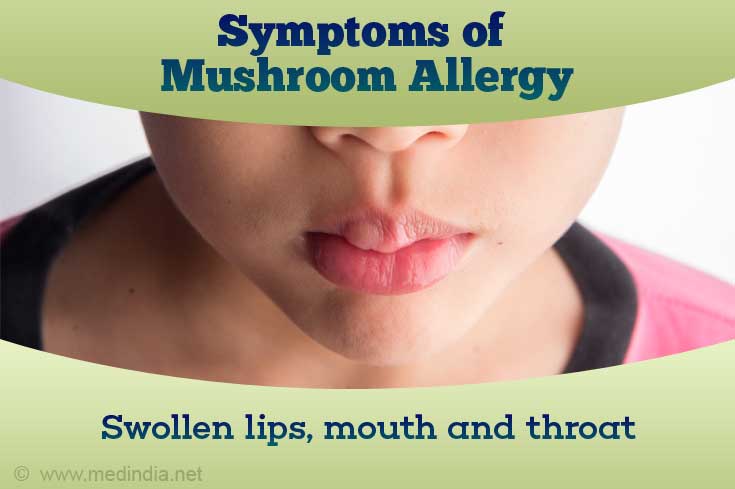
- Abdominal disturbances such as diarrhea, vomiting, nausea, cramping and bloating may also be experienced.
How to Diagnose the Allergy?
The most obvious method to detect an allergy to mushrooms is to observe the symptoms of the allergy after consuming the mushrooms.
For a more concrete diagnosis, a food allergy test is performed. During this test, a minute amount of the mushroom protein is injected into the skin. If any inflammation or redness is observed, the patient is tested positive for mushroom allergy. At all times during the test, the doctors should be prepared to treat any adverse reaction that could occur during the test.
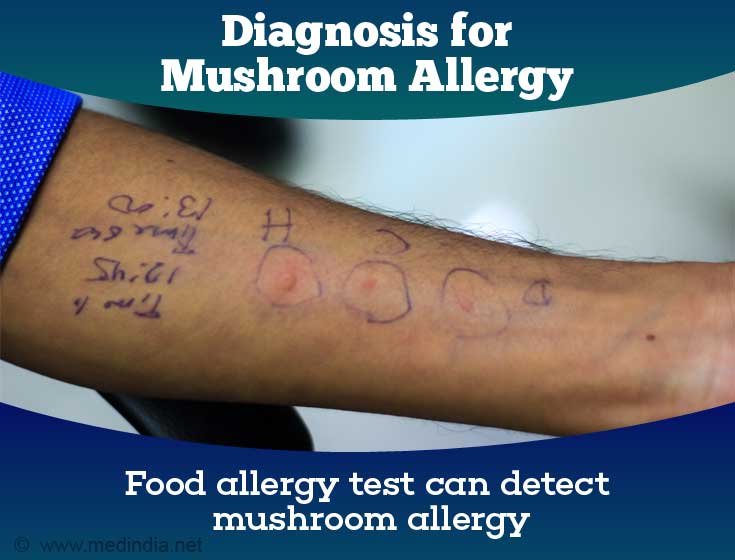
How is Mushroom Allergy Treated?
- Once the diagnosis of an allergic reaction is made, an antihistamine should be administered to relieve the patient from the distress caused due to mushroom allergy. If symptoms are severe, a steroid will be useful.
- Immunotherapy may help if there is respiratory allergy to mushroom.
- An anaphylactic reaction requires paramedic assistance and an immediate shot of epinephrine that will relax the respiratory tract.(6✔ ✔Trusted Source
Mushroom Poisoning
Go to source)
How to Prevent?
- Allergies are unpredictable and can happen to anyone. For instance, a person who has been consuming mushrooms for years without any reaction can develop a mushroom allergy at any time without prior warning.
- Once you realize that you are allergic to mushrooms, you should avoid them and other mold products such as yeast.
- Some packaged foods such as sour cream, dried fruits, alcohol products such as beer and wine, sour milk, cheese and pickled meat and fish could also produce a similar reaction. Therefore, these products should be taken with caution and in small amounts.
- Another preventive measure would be to carry some anti-allergic medicines with you. Nasal steroids can be used to prevent the inflammation of the upper respiratory tract and its symptoms.
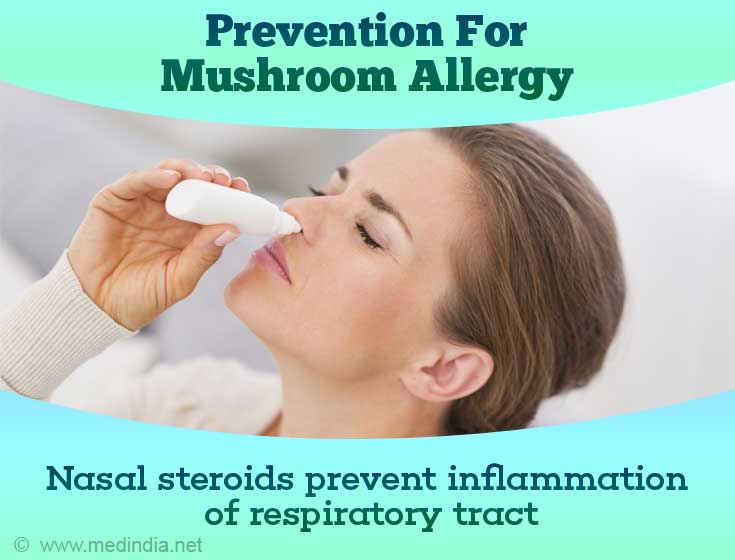
Health Tips
- It is best to avoid mushrooms in your diet(7✔ ✔Trusted Source
Food Poisoning | Mushroom Poisoning
Go to source) if you are prone to allergies. - Remember that besides eating mushroom, spores too can cause allergic reaction. So avoid their exposure.
- Ensure there are no dark and damp areas in your home to prevent the growth of fungi and molds.


